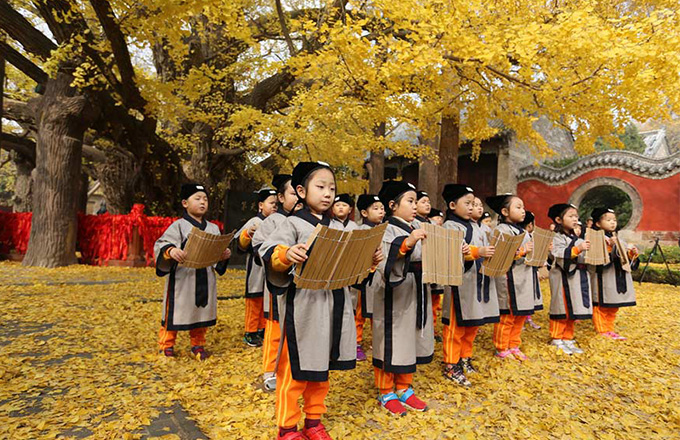The new generation of 'best paid' jobs
But things only really picked up in 2006, with the creation of Taobao, the online shopping bazaar.
Until then her business was mainly reliant on word of mouth.
But since the start of the online retail revolution, "everyone wants to wear a qungua in China", she said, and interest has spread around the world.
And with the advent of Weibo, on which photos of blushing brides smiling sweetly can be published, business has soared at her XiaoruQungua Studio.
"Now I have to limit the number of costumes produced," said Tang, who employs about 50 embroiderers, most older than 50, who can make a maximum of 150 costumes a year, with the most delicate, dubbed the guahuang, or the king of gua, taking three months to make.
A guahuang, with at least 80 percent of the space of the dress covered by embroidery, is priced at around 50,000 yuan (US$8,000), while the simplest designs cost 6,000 yuan.
"Many don't want to do this job. Making qungua is an art, and it's been undervalued," said Tang, who, together with her team, now runs a multimillion-yuan business.
It is thought there are less than 30 embroiderers in China younger than 30, who have the skills needed to design a traditional qungua.
It takes about 300 stages, from drawing a sketch to the final ironing, to complete a qungua, according to Tang, the majority of which is done by hand.
"It's different from machine work. A hand-embroidered phoenix, for example, is 3-D and should look as if there is a real one wrapped around the body of the bride," said Tang.
Her biggest worry is finding embroiderers. "It's much too painstaking a job for many. One has to sit there embroidering for 12 hours a day — poor eyesight and shoulder pain come with the territory."
Online writers
Xia Yi never expected that publishing his own online novel would bring him a fortune. "But I am just transfixed by looking at the click rate on my story soar," he said.
Xia's novel, The Last Taoist, first published on the online community site Baidutieba, has now attracted about 200 million hits.
"I work in IT and that has nothing to do with my writing. But I started the novel to share some of my life experiences with others," said the 27-year-old from Hangzhou, the capital of Zhejiang province.
The novel is based around the legend of a Taoist who is skilled in spells and magic, who fights with various devils to save people's lives, but who ends up being punished as he interrupts the order of destiny.
"My aunt and uncle told me the story when I was young, so it is rooted in my mind," he added.To enrich the story, Xia interviewed some old men from his hometown in Anji county, Zhejiang province, and started writing the story in May last year.
"I write for three to four hours every night when it is quiet, so I can focus on the story," he said.
He first posted the story on BaiduTieba, which is free to readers. But when he reached about 70,000 words, a professional online reading website, Motie.com — a branch of China's biggest private publisher, Beijing Motie Book Ltd — contacted him and asked him to sign a deal with them.





















